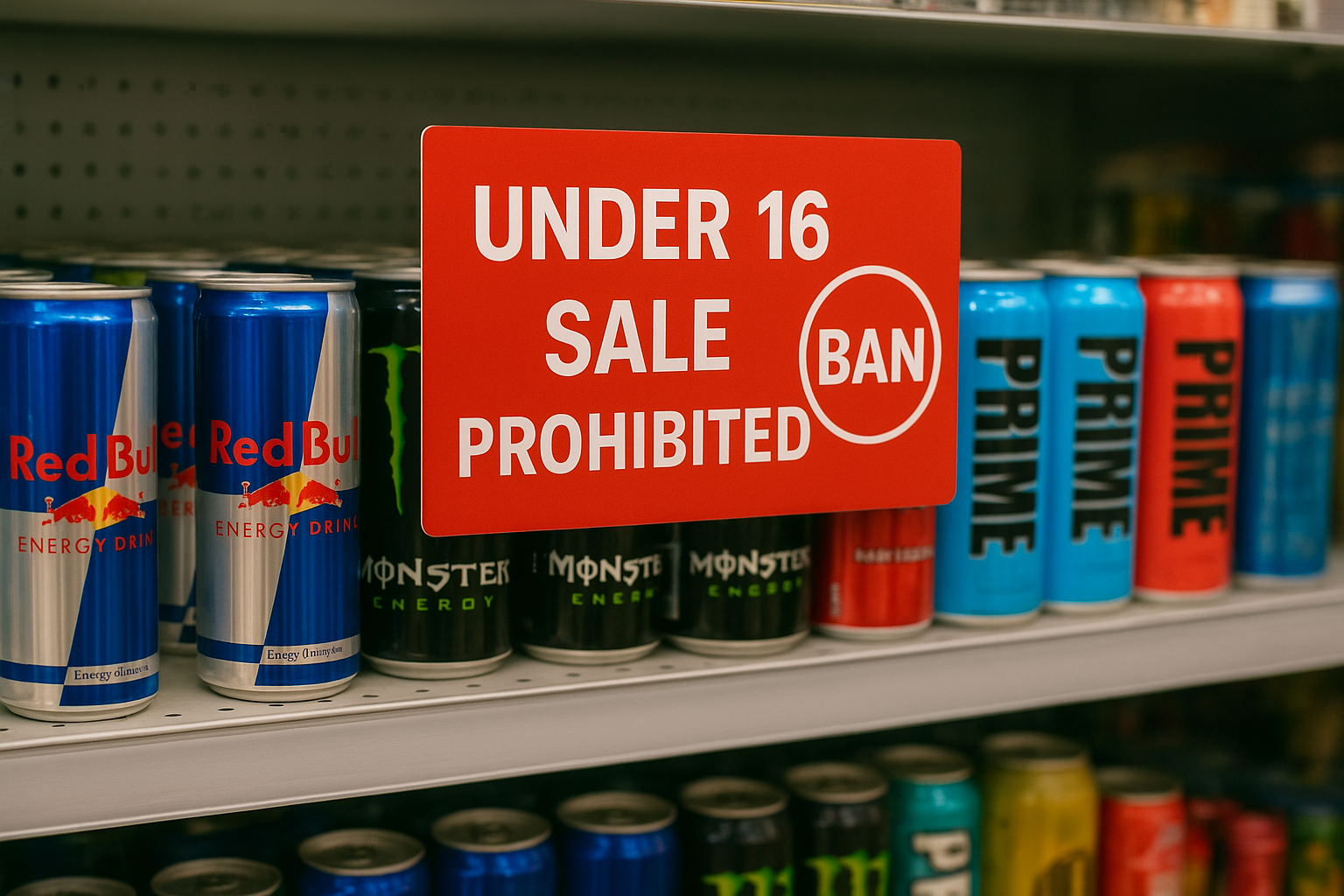
The UK government is moving forward with a ban on the sale of high-caffeine energy drinks to under-16s in England. Any drink containing more than 150mg of caffeine per litre will be restricted – this includes popular brands like Red Bull, Monster, Relentless, and Prime Energy.
Health experts, teaching unions and dentists have welcomed the ban, after raising concerns over the effects of energy drinks on young people’s health.
The main concerns raised are the effects of energy drinks on physical and mental health. Energy drinks typically contain high levels of sugar and caffeine. The high sugar content (up to 20 teaspoons per can) contributes to weight gain and obesity, which in turn increase the risk over time of diabetes and cardiovascular disease.
Sugary drinks also contribute to tooth decay, and dentists warn they become ‘habit-forming “and are highly acidic, leading to erosion of tooth enamel.” Caffeine is a stimulant and high caffeine levels affect sleep, mood and concentration – which can impact on behaviour in the school setting.
Teachers have reported seeing students becoming hyperactive, inattentive and unable to concentrate and engage in lessons. Caffeine can also lead to sleep disruption and insomnia. Lack of sleep leads to low energy and mood, which in turn can lead to seeking out another energy drink, creating an unhealthy cycle.
The same health implications apply to adults as well, but special concern has been raised about young people as their neurological and hormonal systems are still developing, and dopamine spikes from caffeine and sugar can become habit forming, increasing the risk of obesity and other health related issues in the future.
Teachers have noted that children are coming to school (often without eating breakfast) and using energy drinks for a ‘boost’ to their energy, suggesting they are used as a quick fix in place of developing good eating habits.
Current situation
Many retailers and supermarkets voluntarily stopped selling energy drinks to under-16s back in 2018, but some smaller retailers still sell to under 16s. Drinks containing more than 150mg of caffeine per litre already carry warning labels that they are “not suitable for children”, but teenagers can still go and buy these drinks themselves.
How will the ban work
All retailers, including shops, restaurants, cafes and even websites, will be prohibited from selling energy drinks containing more than 150mg of caffeine per litre to anyone under 16. As an example, a standard 250ml can of Red Bull contains 80mg of caffeine, which translates to 320mg per litre – more than double the proposed threshold. The government has stated that the law will be introduced using secondary legislation under the Food Safety Act 1990
Age restrictions are already in place on children under 16 buying other products such as alcohol, cigarettes and medicinal products, so it is anticipated the scheme will be successful in reducing sales to young people.
The law is targeting the retail sale of these products and not the possession, so parents could still give energy drinks to their children if they choose. However, by raising awareness of the dangers and unhealthy nature of energy drinks, the Government hopes to reduce habitual use and help improve children’s mental and physical health and their concentration and attainment in school. Education experts and teachers also hope the ban will improve engagement and behaviour in classrooms as well.
A 12-week consultation was launched last month to gather input from health experts, educators, retailers, and the public. Once that concludes and legislation is finalized, the ban could be enacted relatively quickly — possibly in early to mid-2026, depending on parliamentary scheduling and enforcement planning.
Health Secretary, Wes Streeting, commenting on the proposed ban said; “How can we expect children to do well at school if they have the equivalent of a double espresso in their system on a daily basis?Energy drinks might seem harmless but the sleep, concentration and wellbeing of today’s kids are all being impacted, while high sugar versions damage their teeth and contribute to obesity.”
Photo: Supermarket shelves displaying popular energy drinks, as the government moves to ban sales to under-16s in England. (Credit: Image /AI via ChatGPT)
Rachel Kayani,
Science Tutor and Writer